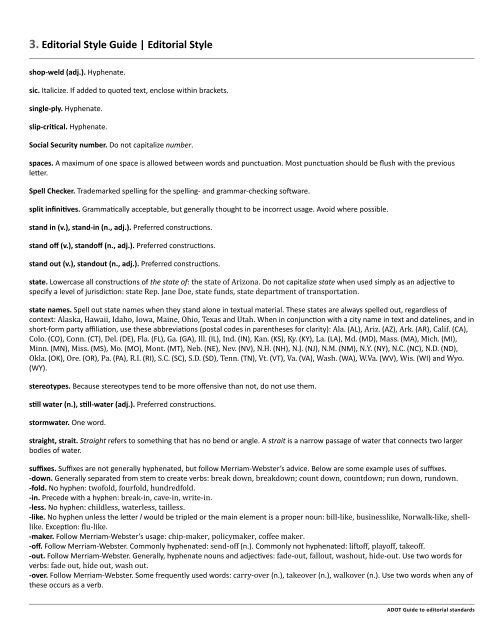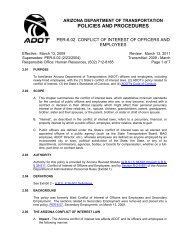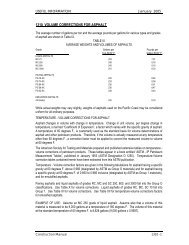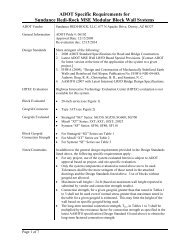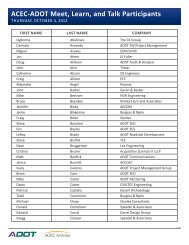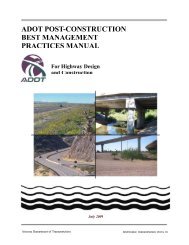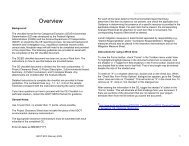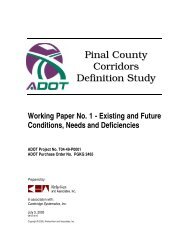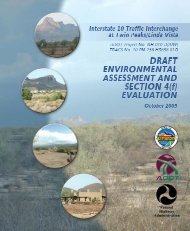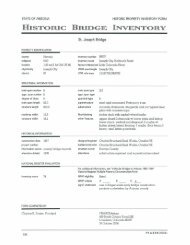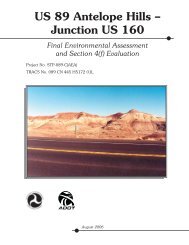ADOT Editorial Style Guide - Arizona Department of Transportation
ADOT Editorial Style Guide - Arizona Department of Transportation
ADOT Editorial Style Guide - Arizona Department of Transportation
You also want an ePaper? Increase the reach of your titles
YUMPU automatically turns print PDFs into web optimized ePapers that Google loves.
3. <strong>Editorial</strong> <strong>Style</strong> <strong>Guide</strong> | <strong>Editorial</strong> <strong>Style</strong><br />
shop-weld (adj.). Hyphenate.<br />
sic. Italicize. If added to quoted text, enclose within brackets.<br />
single-ply. Hyphenate.<br />
slip-critical. Hyphenate.<br />
Social Security number. Do not capitalize number.<br />
spaces. A maximum <strong>of</strong> one space is allowed between words and punctuation. Most punctuation should be flush with the previous<br />
letter.<br />
Spell Checker. Trademarked spelling for the spelling- and grammar-checking s<strong>of</strong>tware.<br />
split infinitives. Grammatically acceptable, but generally thought to be incorrect usage. Avoid where possible.<br />
stand in (v.), stand-in (n., adj.). Preferred constructions.<br />
stand <strong>of</strong>f (v.), stand<strong>of</strong>f (n., adj.). Preferred constructions.<br />
stand out (v.), standout (n., adj.). Preferred constructions.<br />
state. Lowercase all constructions <strong>of</strong> the state <strong>of</strong>: the state <strong>of</strong> <strong>Arizona</strong>. Do not capitalize state when used simply as an adjective to<br />
specify a level <strong>of</strong> jurisdiction: state Rep. Jane Doe, state funds, state department <strong>of</strong> transportation.<br />
state names. Spell out state names when they stand alone in textual material. These states are always spelled out, regardless <strong>of</strong><br />
context: Alaska, Hawaii, Idaho, Iowa, Maine, Ohio, Texas and Utah. When in conjunction with a city name in text and datelines, and in<br />
short-form party affiliation, use these abbreviations (postal codes in parentheses for clarity): Ala. (AL), Ariz. (AZ), Ark. (AR), Calif. (CA),<br />
Colo. (CO), Conn. (CT), Del. (DE), Fla. (FL), Ga. (GA), Ill. (IL), Ind. (IN), Kan. (KS), Ky. (KY), La. (LA), Md. (MD), Mass. (MA), Mich. (MI),<br />
Minn. (MN), Miss. (MS), Mo. (MO), Mont. (MT), Neb. (NE), Nev. (NV), N.H. (NH), N.J. (NJ), N.M. (NM), N.Y. (NY), N.C. (NC), N.D. (ND),<br />
Okla. (OK), Ore. (OR), Pa. (PA), R.I. (RI), S.C. (SC), S.D. (SD), Tenn. (TN), Vt. (VT), Va. (VA), Wash. (WA), W.Va. (WV), Wis. (WI) and Wyo.<br />
(WY).<br />
stereotypes. Because stereotypes tend to be more <strong>of</strong>fensive than not, do not use them.<br />
still water (n.), still-water (adj.). Preferred constructions.<br />
stormwater. One word.<br />
straight, strait. Straight refers to something that has no bend or angle. A strait is a narrow passage <strong>of</strong> water that connects two larger<br />
bodies <strong>of</strong> water.<br />
suffixes. Suffixes are not generally hyphenated, but follow Merriam-Webster’s advice. Below are some example uses <strong>of</strong> suffixes.<br />
-down. Generally separated from stem to create verbs: break down, breakdown; count down, countdown; run down, rundown.<br />
-fold. No hyphen: tw<strong>of</strong>old, fourfold, hundredfold.<br />
-in. Precede with a hyphen: break-in, cave-in, write-in.<br />
-less. No hyphen: childless, waterless, tailless.<br />
-like. No hyphen unless the letter l would be tripled or the main element is a proper noun: bill-like, businesslike, Norwalk-like, shelllike.<br />
Exception: flu-like.<br />
-maker. Follow Merriam-Webster’s usage: chip-maker, policymaker, c<strong>of</strong>fee maker.<br />
-<strong>of</strong>f. Follow Merriam-Webster. Commonly hyphenated: send-<strong>of</strong>f (n.). Commonly not hyphenated: lift<strong>of</strong>f, play<strong>of</strong>f, take<strong>of</strong>f.<br />
-out. Follow Merriam-Webster. Generally, hyphenate nouns and adjectives: fade-out, fallout, washout, hide-out. Use two words for<br />
verbs: fade out, hide out, wash out.<br />
-over. Follow Merriam-Webster. Some frequently used words: carry-over (n.), takeover (n.), walkover (n.). Use two words when any <strong>of</strong><br />
these occurs as a verb.<br />
<strong>ADOT</strong> <strong>Guide</strong> to editorial standards


